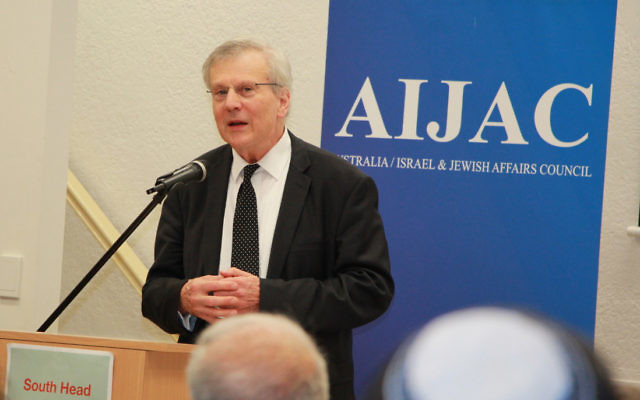Signals from the House of Saud
Fascinating insights into small, but growing “friendly” engagements taking place between Saudi Arabia and Israel – officially enemies – were shared by The Washington Institute’s specialist in Saudi politics and Arab state relations, Simon Henderson, at South Head Synagogue on August 29.

FASCINATING insights into small, but growing “friendly” engagements taking place between Saudi Arabia and Israel – officially enemies – were shared by The Washington Institute’s specialist in Saudi politics and Arab state relations, Simon Henderson, at South Head Synagogue on August 29.
Part of the shul’s Speaker’s Forum series, held in conjunction with the Australia/Israel & Jewish Affairs Council, and in his only Sydney appearance, Henderson began by presenting evidence of the two nations taking tiny, unofficial, steps closer in the spheres of politics, economics and defence.
Recent examples include retired Saudi Major-General Anwar Eshki leading a delegation to Israel in late July to discuss matters of mutual interest, and a meeting in Washington in mid-2015 between Eshki and Dore Gold, who will soon be appointed Director-General of Israel’s Foreign Ministry.
Earlier this year, Saudi Prince Turki al-Faisal shook hands with former Israeli defence minister Moshe Ya’alon and spoke with a former national security adviser to Prime Minister Benjamin Netanyahu.
“I have anecdotal evidence, too, of conversations by Saudis about looking for business opportunities between the two countries,” Henderson said.
Factors include the common threat of Iran and associated shared security and stability interests within the broader Middle East – and a “shared perception” that the US can’t be relied upon to act in the region as they have in the past.
“Saudi Arabia is a leader of the Islamic world by virtue of its custodianship of the holy places of Mecca and Medina, it is a leader of the Arab world and it is certainly the leader of the energy world,” Henderson said.
“So it is a serious country and one which Israel, in this context, would be foolish not to engage with if the opportunity arises.
“Peace has yet to be made between the two countries and theoretically, I believe, they are notionally still at war.
“But there are contacts. The question is, are those contacts going to evolve into relations?”
Henderson did offer some words of caution.
“It would seem that Israel shouldn’t put too much faith in any individual Saudi – it all has to be balanced against what else Mohammad bin Salman Al Saud [the deputy crown prince of Saudi Arabia and defence minister] may or may not do,” he said.
Other potential complications Henderson mentioned are Saudi Arabia’s suspected arrangement with Pakistan that it would be supplied with nuclear weapons if it needed them to deter Iran, and Saudi Arabia’s provision of weapons to jihadi rebel fighters in Syria.
SHANE DESIATNIK

comments